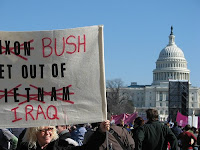
The documentary The Fog of War was incredibly interesting to me. I had seen it before, but this time I really thought about what Robert McNamara was saying and the points he was trying to convey. I even found myself reflecting on the film at the dinner table with some of my family. I thought it was great to see and hear a man's point of view who was on the inside of it all, and wasn't just a witness to history. He created history. I came out of the class period with more knowledge than I did coming into it.
One of the lessons McNamara taught me is the importance of decisions. He emphasized the significance of thinking decisions through before acting on them. I make decisions for my own well being and my family, but he had to make decisions for himself along with the rest of the United States. Every time he decided on something, the nation would either be helped by the judgement or harmed by his mistake. He believes that there were times he did make the right call, and then there were times he didn't. Sometimes he would have to make quick decisions out of fear or efficiency, and in those seconds, he may have choose the wrong path. In deciding quickly, he wasn't always able to get the whole story. If he had the whole story, there might not have been bombs dropped or chemicals sprayed. A lot of people disagree with the choices McNamara made, and view them as severe mistakes. Though at the same time, some of his decisions had to be done. They may not have been the most moral or humane thing to do, but at the time there might not have been another option. In the novel, The Things They Carried, Tim O'Brien states that, "A true war story is never moral. It does not instruct, nor encourage virtue, nor suggest models of proper human behavior, nor restrain men from doing the things men have always done" (68). In war, the lines are gray, and the decisions don't follow the usual guideline. There doesn't seem to be any signs of morality when it comes to war. McNamara had to make the hard decision for the country. He did what he believed was best for the nation, and then would take the blame for it, If he hadn't made some of those hard decisions, we never would have been able to attain some of the amazing things we did.
The choices I make everyday may not be near as drastic or costly, but they have an effect on myself and the people around me. I need to value the thought process, and make sure I am being careful and considerate every time I agree to something. Through this documentary I now understand that one decision can change an entire nations lives, and that sometimes you need to something considered bad or even evil, in order to do something good or achieve something great.
